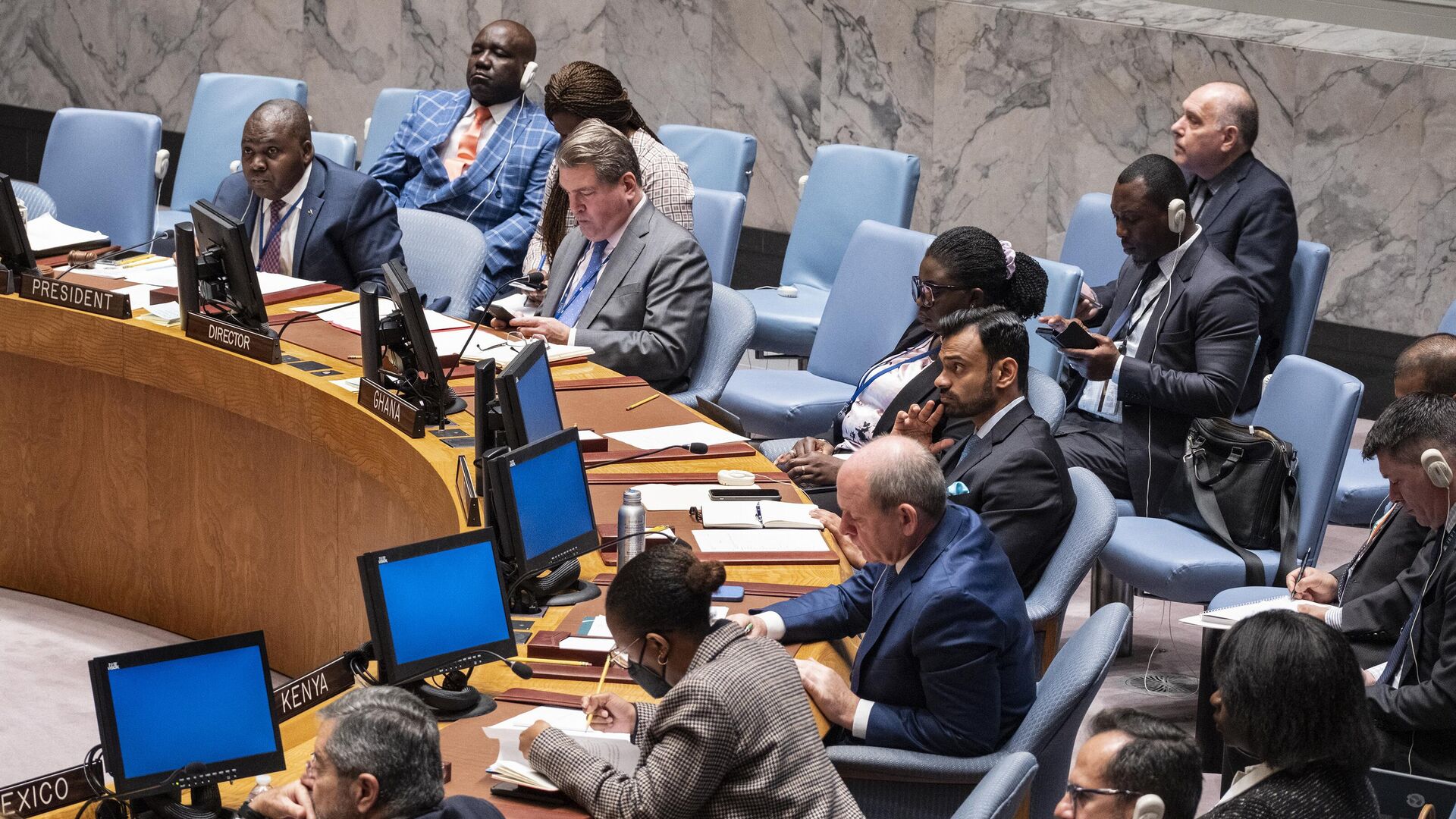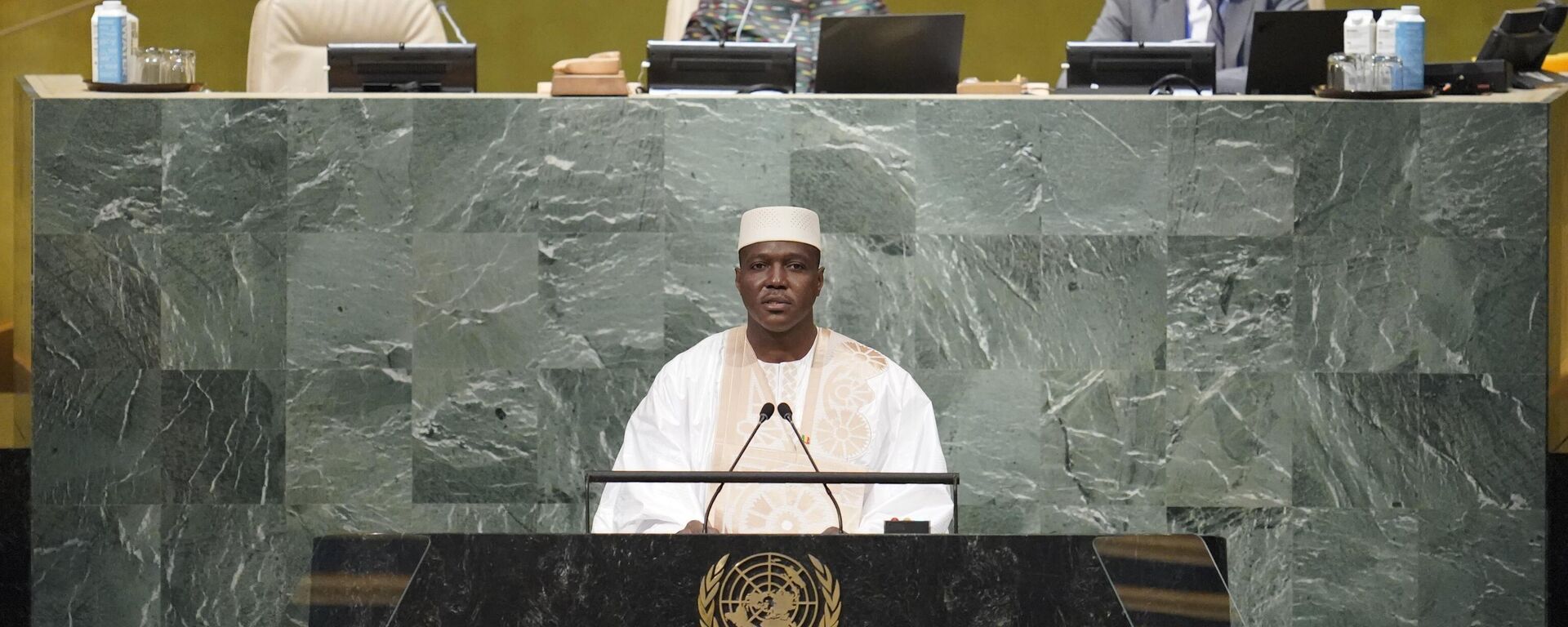https://sputnikglobe.com/20230310/african-members-voices-must-be-heard-on-reforming-unsc-penholderships-russian-envoy-says-1108247893.html
African Members' Voices Must Be Heard on Reforming UNSC Penholderships, Russian Envoy Says
African Members' Voices Must Be Heard on Reforming UNSC Penholderships, Russian Envoy Says
Sputnik International
African nations' opinion must be considered while reforming penholderships in the United Nations Security Council, councellor of the Russian mission to the UN Dina Gilmutdinova has said
2023-03-10T13:59+0000
2023-03-10T13:59+0000
2023-03-10T13:59+0000
africa
russia
the united nations (un)
un security council (unsc)
reform
diplomats
un general assembly
mali
https://cdn1.img.sputnikglobe.com/img/07e6/0b/13/1104434255_0:0:3211:1807_1920x0_80_0_0_37aff088ca1d1e5e0f569de8a2b7a4cb.jpg
African nations' voices must be heard when reforming the United Nations Security Council’s penholderships, Counsellor of the Russian mission to the UN Dina Gilmutdinova has said.During a session of the UN General Assembly dedicated to reforming the Security Council, Gilmutdinova emphasized the necessity of reviewing penholderships and their restructurization, saying the opinion of the three African non-permanent Security Council members (Gabon, Ghana, Mozambique) must be considered.She said "special attention" must be paid to the African trio, which have much-needed experience and potential. At the same time, as envisaged by thesis 507 of the chairperson's note, each Security Council member can be a penholder and more than one can be a co-penholder.In the UN Security Council, penholders are states responsible for, among other things, drawing up resolutions and arranging meetings on certain issues.Gilmutdinova also emphasized that Russia advocated "boosting the number of penholders and co-penholders, first and foremost, all with non-permanent members" of the UN Security Council.The diplomat believes reviewing the issue of penholderships will contribute to enhancing the effectiveness of the UN Security Council's performance.Earlier this month, Mali sent a letter to the current chairperson of the UN Security Council, Mozambique’s permanent representative, Pedro Comissario Afonso, saying it rejected France's status as a penholder for the country.Since December 2012, France has had this status over all issues concerning Mali within the UN Security Council, including the United Nations Multidimensional Integrated Stabilization Mission in Mali (MINUSMA) and sanctions, the letter read.In the letter, the foreign minister of Mali said the country had repeatedly reported violations of its airspace by French forces. Moreover, on August 15, 2022, Mali appealed to the UN Security Council over "acts of aggression, violations of airspace, subversion and destabilization" by the French armed forces.August 15, 2022, Mali achieved a troop pullout from its soil by the French, whose military had been present there since 2013 under the pretext of countering the surge of terrorist activities in the Sahel region.Earlier this year, the African nation terminated bilateral defense agreements with its former colonial ruler, France, accusing it of "a de-facto partition of the West African country."
https://sputnikglobe.com/20230303/mali-challenges-frances-penholder-status-at-united-nations-security-council-1107953382.html
africa
russia
mali
Sputnik International
feedback@sputniknews.com
+74956456601
MIA „Rossiya Segodnya“
2023
News
en_EN
Sputnik International
feedback@sputniknews.com
+74956456601
MIA „Rossiya Segodnya“
Sputnik International
feedback@sputniknews.com
+74956456601
MIA „Rossiya Segodnya“
penholders, un security council reform, un general assembly session, dina gilmutdinova, russian mission to the un
penholders, un security council reform, un general assembly session, dina gilmutdinova, russian mission to the un
African Members' Voices Must Be Heard on Reforming UNSC Penholderships, Russian Envoy Says
The system of leadership by the UN Security Council members on specific issues was developed around 2008-2009 with the "leaders" called "penholders", who are responsible for drafting resolutions and chairing negotiations on certain topics. In fact, according to a December 2018 UNSC report, the US, the UK, and France are penholders in most cases.
African nations' voices must be heard when reforming the United Nations Security Council’s penholderships, Counsellor of the Russian mission to the UN Dina Gilmutdinova has said.
During a session of the UN General Assembly dedicated to reforming the Security Council, Gilmutdinova
emphasized the necessity of reviewing penholderships and their restructurization, saying the opinion of the three African non-permanent Security Council members (Gabon, Ghana, Mozambique) must be considered.
She said "special attention" must be paid to the African trio, which have much-needed experience and potential. At the same time, as envisaged by thesis 507 of the chairperson's note, each Security Council member can be a penholder and more than one can be a co-penholder.
In the UN Security Council, penholders are states responsible for, among other things, drawing up resolutions and arranging meetings on certain issues.
"Now only three delegations [the US, the UK, France] are penholders on most issues. Despite the fact that colonial powers lost their status ages ago, they still consider themselves regional experts and act as though they are mentors for other states or even regions," the councellor said.
Gilmutdinova also emphasized that Russia advocated "boosting the number of penholders and co-penholders, first and foremost, all with non-permanent members" of the UN Security Council.
The diplomat believes reviewing the issue of penholderships will contribute to enhancing the effectiveness of the UN Security Council's performance.
"We will continue to put this issue forward in the informal group on documentation and other procedural issues," she added.
Earlier this month, Mali
sent a letter to the current chairperson of the UN Security Council, Mozambique’s permanent representative, Pedro Comissario Afonso, saying it rejected France's status as a penholder for the country.
Since December 2012, France has had this status over all issues concerning Mali within the UN Security Council, including the United Nations Multidimensional Integrated Stabilization Mission in Mali (MINUSMA) and sanctions, the letter read.
In the letter, the foreign minister of Mali said the country had repeatedly reported violations of its airspace by French forces. Moreover, on August 15, 2022,
Mali appealed to the UN Security Council over "acts of aggression, violations of airspace, subversion and destabilization" by the French armed forces.
"These facts [...] raise questions about the objectivity and impartiality of the French Republic," noted the letter.
August 15, 2022, Mali achieved a troop pullout from its soil by the French, whose military had been present there since 2013 under the pretext of countering the surge of terrorist activities in the Sahel region.
Earlier this year, the African nation terminated bilateral defense agreements with its former colonial ruler, France,
accusing it of "a de-facto partition of the West African country."
"The intervention [of France] turned into a de-facto partition of Mali, which contributed to the sanctuarisation of our territories for the terrorists who had time to take refuge and reorganise themselves in order to come back in force," Malian Prime Minister Choguel Kokalla Maiga said, speaking to diplomats in Bamako, Mali.



